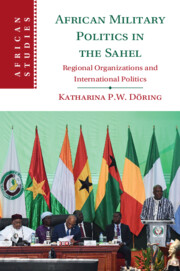Refine search
Actions for selected content:
2 results
Introduction
-
- Book:
- African Military Politics in the Sahel
- Published online:
- 02 November 2023
- Print publication:
- 16 November 2023, pp 1-33
-
- Chapter
-
- You have access
- HTML
- Export citation

African Military Politics in the Sahel
- Regional Organizations and International Politics
-
- Published online:
- 02 November 2023
- Print publication:
- 16 November 2023
